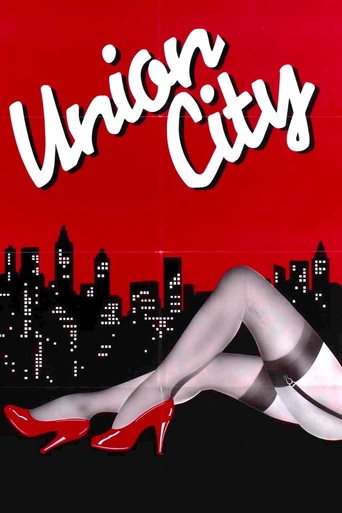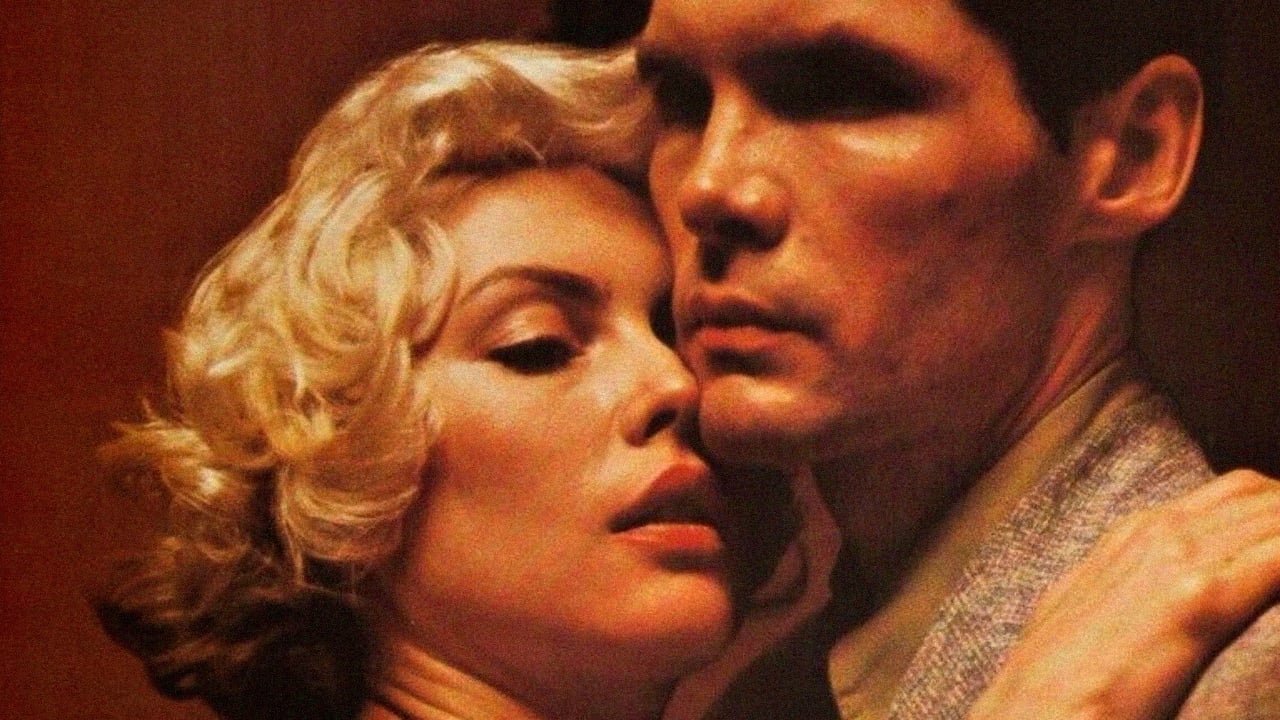christopher-underwood
Several surprises for me in this film. I had never watched it before, rather assuming that it was very much a star vehicle for Deborah Harry. How wrong can you be, she puts in a most solid performance but there is not much star twinkle in this downbeat oddball of a movie. I was also surprised that we did not get, Debbie Harry singing, Union City Blues throughout, maybe this was written later, or considered inappropriate. Biggest surprise of all is just how good the movie is with hardly any 'action' and instead of some big sexy sex scene, a rather sad, lack of sex scene. Runs very much like a low budget independent in a rather 'noir' style and you would be hard put to guess the year, other than from the aforementioned Goddess' presence, of course.
lost-in-limbo
Harlan a whinny repressed accountant lives with his adorably bored housewife Lillian in an apartment building in New Jersey. Somebody is stealing a sip out of their milk bottle every morning and Harlan becomes obsessed in trying to capture the culprit. Although his plan becomes unstuck when the unspeakable happens and soon his trying to put the horrific deed behind him. Although it's harder than he thinks and it's taking on a toll on his already fractured relationship with Lillian. She dreams off escaping this life and she sees this opportunity with her relationship with building superintendent Lance.After my long awaited viewing, I'm left rather bemused by it all. Obviously it's going to be a love or hate affair. Your pick. I'm leaning more towards the former. I just don't think there'll be much middle ground. You can easily see that "Union City" is perfect for repeat viewings to get a hold of every little, significant detail. Think of early David Lynch
like "Easerhead" and you'll know what I mean about being technically limited and strangely dark. Some shots you can clearly see the boom mike appear and it can be distracting. People might say that the technical side of the production is what brings it down and I can see were they're getting at. Otherwise with what Reichert had to work with, he did a resourcefully able job. On that front what we get is a highly moody neo-noir, art-house piece that's on a zero budget and benefits from it's cheaply few, claustrophobic sets in drumming up that anxious, glum and bizarre nature stemming off the film's peculiar characters and storyline.The oddball premise is taken off Cornell Woolrich's 1937 short story "The Corpse Next Door", which goes on to share some similarities to Poe's "The Telltale Heart". So it's all about the progressive guilt and stress of a secret that eventually cracks to lead to ones own self-destruction. Also the obsession of one task, leads to the breakdown in communication of the one thing, which needs the attention. He takes his wife for granted, as nothing more than a material object. The emotionally engaging story mingles with these cards rather neatly with precision and a wryly-black sense of humour. While having a creaky structure, the jittery rhythm and awkward turns only enhanced the film's magnetic atmosphere and credibly crafty approach. This is one of those mellow exercises that you have to have patience, as the film's momentum leisurely ticks along and it's filled with long stretches of silence. Can be quite a drag, if you're not geared up for it. The script is pretty sparse and when there's dialogue its mostly quite trivial.Director Marcus Reichert paints an edgy picture that dabbles in the surreal without losing that serious touch, but visually he mixes the lighting, colour scheme and tight camera-work to convey the ever-changing tenor. From grafting away tension to letting the time slowly go by. Reichert's stylised feel makes it way into the performances.Dennis Lipscomb's exceptional portrayal as the erratically selfish Harlan sticks out compared to the deadpan performances of the rest. This suits how his paranoid character is effecting the actions of those around him. The fetchingly sincere Deborah Harry (in her film debut role) is suitably solid in a sensitively frustrated housewife seeking a way out of the unhappy marriage. It didn't turn out to be much of a stepping stone for her film career, despite her strong presence. Everett McGill gives a likable, level-head performance as the building superintendent Lance. Providing reasonable support are CCH Pounder and Sam McMurrey. Of small interest Pat Benatar shows up in a minor role towards the end. There were another recognizable names that tagged along for the ride. You had Monty Montgomery as creative producer and Kathryn Bigelow as script supervisor. Also Chris Stein (Deborah Harry's fellow band member of Blondie) chips in with an effectively wistful music score that uncannily experiments with a variety of music styles. Namely a smooth blues flavor.This influentially quirky Indie flick is a hard one to recommend, but there are enough elements and a very unhinged tone for cult fans to get something out of this unconventional foray.
bmacv
Union City was to be the vehicle (many of her fans thought) that would launch Deborah Harry, lead singer of Blondie, into screen superstardom. It didn't happen, though Harry went on to appear in numerous movies. But in Union City, she's kept in drab, dark locks until the very end, and gives a stylized, one-note performance, as though she were in a skit. No doubt that was at the prompting of writer/director Marcus Reichert, who made a rigidly stylized movie that looks almost cartoonish though today, `like a graphic novel' might be the better phrase.And that isn't exactly a put-down. The achievement of Union City lies in sustaining interest despite the fact that very little, really, happens. It takes place in 1953, in a tired old apartment house across the Hudson from Manhattan (with a couple of excursions to a corner saloon). Accountant Dennis Lipscomb, a master of the paranoid personality style, is obsessed with a milk thief who drinks from the bottle delivered every morning. His feckless wife (Harry) doesn't pay much attention to his irrational rages, and he in turn pays little attention to her, at least where it counts she's carrying on with the building superintendent (Everett McGill). When Lipscomb finally catches the thief, he accidentally kills him and stows the body in a Murphy bed in a vacant apartment.Most of Union City is a mood piece, with Lipscomb hitting the bottle to drown his guilt and Harry sticking daffodils into her underthings to vent her sexual frustration. The moods are expressed in the movie's distinctive look, with garishly saturated hues glowing through the heavy gloom and some of that look is echoed in later movies like the Coen Brothers' Blood Simple and The Man Who Wasn't There, in David Lynch's Blue Velvet, even in Warren Beatty's Dick Tracy. But Reichert doesn't just surrender to the atmospherics; at the end, when Harry unveils her bottle-blonde tresses, like Tippi Hedren in Marnie, he delivers a twist (courtesy of Cornell Woolrich, who wrote the original story) that daringly relies on the viewer to fill in.
For some reason, the print of this movie released in Canada runs some three minutes longer than the American version. Those three minutes contain a scene in which Harry like Arlene Dahl in Slightly Scarlet, like Elizabeth Taylor in Butterfield 8 scrawls on a mirror with lipstick. (Maybe keeping that scene intact would have given Harry the push to stardom she craved.) Union City can be counted a success (though not a popular one), paving the way for a second-phase cycle sometimes called neo-noir.
batzi8m1
Wonderful low key film about a husband so obsessed with having a few sips of his milk stolen that he fails to pleasure his beautiful young wife for so long that she does it herself in a wonderfully touching scene. This was the standard artists' claim against the materialism of the 50's in which this story seems to be set. It's typical film student's protest against straight society's misplaced priorities in which the starving artist appears the hero, but is imaginative enough and with the right mix of humanity, suspense, plot twists and lingerie touching to make it pleasant to watch. And the ending is satisfying.The Dolacoids refers to the Nazi theory of racial superiority based on the shape of the skull in which the long headed or dolacoid race is destined to rule. The former Stanford professor Thorsten Veblen, more known for his "Theory of the Leisure Class" -- the groundbreaking analysis of conspicuous consumption, wrote a brilliant satire of Nazi race theory entitled The Rise and Fall of the Dolocoid Race in which he proves that Dolocoids are destined for extinction because they are so concerned with their status and conspicuous consumption that they fail to have time to perform their filial duties, and hence produce no offspring, while the roundheads seem to make that a priority.This movie does a great job of working this theme. And I do mean that the scene in which a beautiful young woman like Blondie, is neglected for the sake of a sip of milk is tragically moving. Boy some guys really know how to screw up.


 AD
AD


